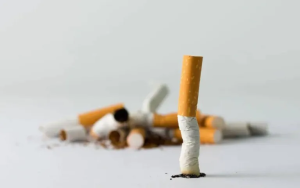Purpose
The purpose of this policy is to ensure that efforts to protect tobacco control from commercial and other vested interests of the tobacco industry are comprehensive, effective and consistent across the United Nations system including the UN itself and its funds, programmes, specialized agencies, other entities and related organizations (hereinafter referred to as “the United Nations system”).
Overview
Tobacco use is one of the most significant preventable causes of death and disease in the world. It is particularly escalating in children and women worldwide. Nearly 80% of the world’s one billion smokers live in low- and middle-income countries.
The objective of the WHO Framework Convention on Tobacco Control (WHO FCTC) is to protect present and future generations from the devastating health, social, environmental and economic consequences of tobacco consumption and exposure to tobacco smoke. This UN Convention is an international treaty that entered into force on 27 February 2005, and has 180 Parties so far.
Full implementation of the WHO FCTC support global commitments to achieving a 25% reduction in premature deaths from noncommunicable diseases by 2025, including a 30% reduction in the prevalence of tobacco use in persons aged 15 years and over.
The WHO FCTC is an important tool to ensure that public health is prioritized over industry profits by governments and the UN system, and to ensure the enjoyment of the highest attainable standard of health as one of the fundamental rights of every human being. Article 5.3 of the WHO FCTC stipulates that “Parties shall act to protect public health policies with respect to tobacco control from commercial and other vested interests of the tobacco industry in accordance with national law”. The Conference of the Parties, governing body of the Convention, adopted guidelines for implementation of Article 5.3 in 2008, to assist Parties in their work on implementation of this article.1 The observers to the Conference of the Parties, although not bound by the treaty, are expected to work and act in the spirit of the Convention and its implementation guidelines.
Implementation of Article 5.3 and its guidelines will also bring an important contribution to achieving the Sustainable Development Goals, in particular Goal 3 on ensuring healthy lives and promoting well-being, target 3.a on strengthening implementation of the WHO FCTC and target 16.5 on substantially reducing corruption and bribery in all its forms. Interference by the tobacco industry remains one of the greatest obstacles to implementing the WHO FCTC.
Tobacco industry interference takes many forms. These include:
– manoeuvring with lobbyists to influence law-making;
– exaggerating the economic importance of the industry while ignoring the social,
environmental and health costs caused by tobacco and tobacco products;
– manipulating public opinion to gain the appearance of respectability, e.g. by investing
funds in youth programmes or nature conservation groups or disaster relief; this is part of efforts to look “socially responsible”. The corporate social responsibility of the tobacco industry is an inherent contradiction since the tobacco industry’s core functions are in conflict with the goals of public health.
– fabricating support through front groups which are phony “grassroots” groups that
support its interests,
– attempting to discredit proven science; and
– intimidating governments with litigation or the threat of litigation.
A multisectoral—whole of government, whole of UN and whole of UN entity—approach is necessary to fully and rapidly implement the WHO FCTC. Broadening the scope of the UN Inter Agency Task Force on Tobacco Control established in 1999, the UN Secretary-General established the UN Interagency Task Force on the Prevention and Control of Noncommunicable Diseases in 2013.3 Its terms of reference include ensuring that tobacco control continues to be duly addressed and prioritized while recognizing that public health policies for the prevention of noncommunicable diseases [such as those caused by tobacco use] must be protected from undue influence by any form of vested interest.
Scope of Article 5.3 of the WHO FCTC and its implementation guidelines
Article 5.3 of the Convention provides the policy framework for protecting public health policies
with respect to tobacco control from the commercial and other vested interests of the tobacco
industry. Furthermore, the recommendations of the implementation guidelines on Article 5.3, extend to all types of engagement and association with the tobacco industry, including, but not limited to, financial and in-kind contributions, secondments, meetings and events, programmatic initiatives, advertising, promotion and sponsorship, corporate social responsibility initiatives and advocacy, hereinafter referred to as “engagement with the tobacco industry”.
Article 5.3 and its guidelines aim to prevent interference not only by the tobacco industry, but also by organizations and individuals that work to further the interests of the tobacco industry, including, but not limited to tobacco growers, manufacturers, wholesale distributors and importers of tobacco products, including State-owned, as well as lobbyists and associations. All these entities are hereinafter referred to as “the tobacco industry”.
Other existing UN documents also relate to implementation of Article 5.3 of the Convention. The “Guidelines on Cooperation between the United Nations and the Business Sector” (UN Guidelines) provide a framework for UN agencies on the development of their own policies.
However, the UN Guidelines rely on the application of the UN Global Compact’s ten principles, which is problematic given the inadequacies of the UNGC policy on tobacco industry participation. Nonetheless, the UN Guidelines specifically state that “the UN will not engage with Business Sector entities that are complicit in human rights abuses, tolerate forced or compulsory labour or the use of child labour, are involved in the sale or manufacture of anti-personnel landmines or cluster bombs, or that otherwise do not meet relevant obligations or responsibilities required by the United Nations”.
Additional frameworks within the UN system that could be applied and adapted for limiting tobacco industry interactions. These include: (1) the International Code of Conduct for Public Officials, adopted by the UN General Assembly in December 1996, which could provide a model for ensuring there is no conflict of interest between public and private interest; (2) the UN Public Administration Programme, which offers a series of resources for governments to strengthen transparency and conduct policies; (3) the Code of Ethics for UN personnel, which provides language for preventing conflict of interests and rejection of gifts; and (4) United Nations Joint Staff Pension Fund (UNJSPF) has a policy that restricts investments in the tobacco industry, including any corporations that derive any portion of its revenue from tobacco production or primarily deal with tobacco manufacturing and distribution.
UN agencies such as the World Health Organization (WHO), UN Development Programme (UNDP) and the United Nations Educational, Scientific and Cultural Organization UNESCO are among the agencies that have taken steps to implement policies that are in compliance with the proposal described below.
Model policy for agencies of the United Nations system on preventing tobacco industry interference.
Guiding principles The enjoyment of the highest attainable standard of health is one of the fundamental rights of every human being.
There is a fundamental and irreconcilable conflict between the tobacco industry’s interests and
public health policy interests.
The United Nations system, including the intergovernmental agencies that are observers to COP
and members of the UN Inter Agency Task Force, must work as One, ensuring a consistent and
effective separation between its activities and those of the tobacco industry, to preserve its
integrity and reputation and in promoting development.
Engagement with the tobacco industry is contrary to the United Nations system’s objectives,
fundamental principles and values.
The United Nations system, including the intergovernmental agencies that are observers to COP and members of the UN Inter Agency Task Force shall establish measures to limit interactions with the tobacco industry, and where interactions still occur, the recommendations of the guidelines for implementation of Article 5.3 of the Convention shall apply. Specific measures to be included in the policy.
To limit interactions and avoid any real or perceived partnership with the tobacco industry, as
an entity of the United Nations system, [Name of the Agency] should: Inform and educate all entities and leadership in [Name of the Agency] about the addictive and harmful nature of tobacco products, the need to protect public health policies for tobacco control from the tobacco industry’s interests and the strategies and tactics used by the tobacco industry to interfere with the development of relevant policies through, inter alia, individuals, front groups and affiliated organizations that act, openly or covertly, on their behalf.
Reject partnerships, joint programs, non-binding or non-enforceable agreements and any other
voluntary arrangements with the tobacco industry.
Do not grant permission to the tobacco industry to use the name, logo and emblem of [Name of the Agency]. Further, measures should be taken to actively prevent the tobacco industry from using the name, logo and emblem of the organization. Carry out any strictly necessary interaction with the tobacco industry in such a way as to avoid the creation of any real, perceived or potential conflict of interest resulting from or on account of such interaction and ensure the transparency of those interactions that occur through, for example, making the records of such interactions available to the public. If strictly necessary to promote the goals of [Name of the Agency], meetings with the tobacco industry (1) must take place at a neutral venue for a mediated exchange and for the purpose information exchange, i.e. to receive certain information relevant to public health or the goals of the United Nations system from the tobacco industry, and (2) present to the tobacco industry [Name of the Agency’s] policy on engagement with the tobacco industry and [Name of the Agency’s] views on tobacco-related health, social, environmental and economic issues. Before the meeting, [Name of the Agency] shall clearly indicate in writing to the tobacco industry that they must not mischaracterize the nature of the meeting in such a way that implies that there is any relationship, collaboration or partnership or engagement between [Name of the Agency] and the tobacco industry. After the meeting, the minutes shall be made public to ensure transparency. No meetings should result in a partnership or joint work.
Mandate [if not yet done so] a policy on the disclosure and management of conflicts of interest
for all staff.
Not award contracts to tenderers who have conflicts of interest with established tobacco control policies or whose clients include the tobacco industry or that have, as part of their constituency or governing board or board of directors or advisors a representative of the tobacco industry.
Avoid conflicts of interest for international civil servants of the United Nations system as per the Standards of Conduct for the International Civil Service.6 Payments, gifts and services,hospitality, monetary or in-kind, and research funding offered by the tobacco industry can, for example, create real, perceived or potential conflicts of interest and should not be accepted.
Formulate, adopt and implement [if not yet done so] a code of conduct for staff of [Name of the Agency], prescribing the standards with which they should comply in their dealings with the tobacco industry.
Require a potential donor to provide all relevant information about itself and its activities, including annual income and funding sources, and in particular its links (direct and indirect funding) to the tobacco industry. Thereafter [Name of the Agency] conducts the necessary due diligence, i.e. steps taken to find and verify relevant information on a potential donor and to clarify its interest and objectives and what it expects in return, and decline donations where a real, perceived or potential conflict of interest may arise.
Exclude any person employed by or providing consultancy or other services to the tobacco industry to be a member of any committee, advisory or expert group or governing board delegation.
Share information on industry interference with the UN Interagency Task Force on the Prevention and Control of Noncommunicable Diseases at each regular meeting along with practical examples of countering tobacco interference.
Do not award or give prizes to the tobacco industry to reward activities described as socially responsible performed by the tobacco industry.
Do not invest or disinvest [if you have already invested in] from stocks of the tobacco industry
or any organization that works to further the interests of the tobacco industry.
Resources
Guidelines for implementation of Article 5.3 of the WHO FCTC
http://www.who.int/fctc/treaty_instruments/Guidelines_Article_5_3_English.pdf?ua=1
Technical resources for the implementation of article 5.3
http://apps.who.int/iris/bitstream/10665/44880/1/9789241503730_eng.pdf
World No Tobacco Day 2012 – Tobacco industry interference
http://www.who.int/tobacco/wntd/2012/
Guidelines for responding to requests made by the tobacco industry to meet with WHO staff
http://apps.who.int/iris/bitstream/10665/44880/1/9789241503730_eng.pdf (Annex 4)
More resources on Article 5.3:
http://apps.who.int/fctc/implementation/database/article/article-5/resources










